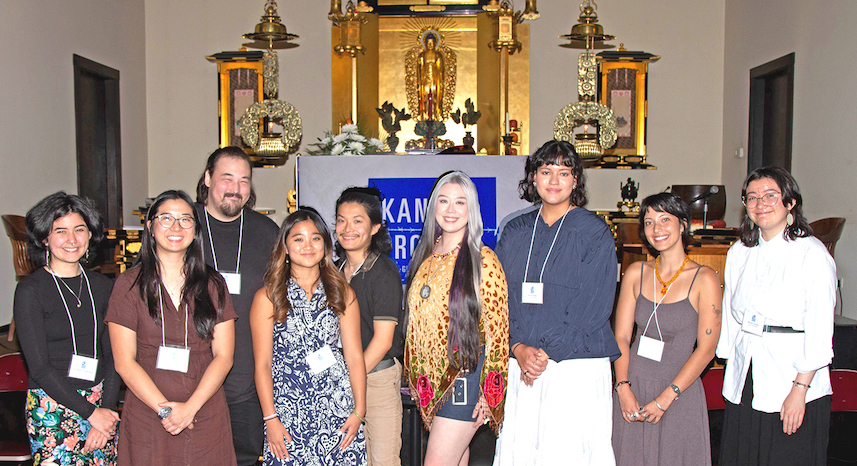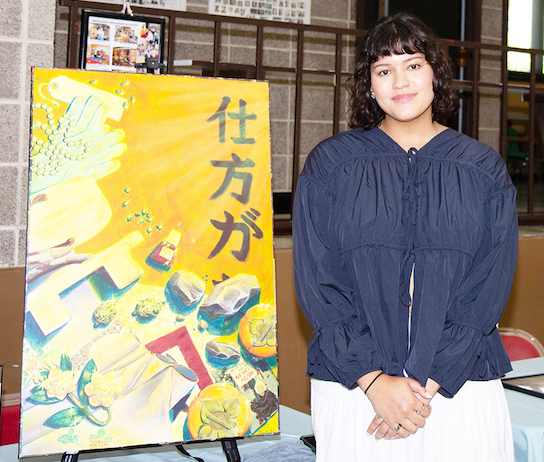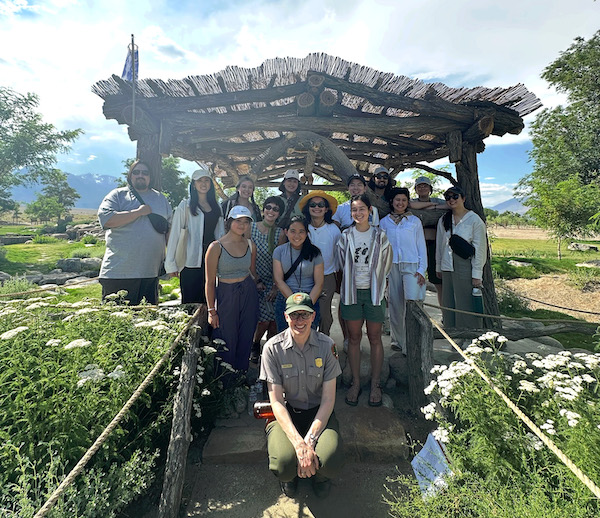Despite challenges, JACL Chicago’s program celebrates intersectional solidarity.

Kansha 2025 participants at the Culmination Ceremony at the Midwest Buddhist Temple. Pictured (from left) are Kendall Terashima, Emily Umeda, Benjamin Barlow, Katie Sasamoto Kurisu, Joshua Kazu Matsuura, Christel Melinga Thompson, Sora Seals, Jacqueline Fowler and Darcy Combs. (Not pictured is Kayla Moy.)
Photos: Kevin Moy
By Amy Do
JACL Chicago’s Kansha Project held its 14th annual Culmination Ceremony on June 28 at the Midwest Buddhist Temple. The cohort had two weeks to put together its culmination projects following a trip to Los Angeles’ Little Tokyo and Manzanar National Historic Site in the Owens Valley. The projects ranged from written work to visual art, coded maps, posters, walking museums and physical art pieces.
Kansha 2025 was rife with challenges and obstacles caused by actions of the current Trump administration. At Manzanar, cuts to National Parks Service funding meant that the cohort was unable to participate in service projects. Instead, Ranger Sarah Bone and her staff at Manzanar structured an in-depth walking tour centered around primary sources, including former Manzanar Committee Chair Sue Kunitomi Embrey’s story.
On the final day, illegal U.S. Immigration and Customs Enforcement raids took place mere blocks from Little Tokyo’s Miyako hotel, where the cohort was staying.
The next day, local organizers were diverted to detentions that were directly impacting their communities, resulting in the cancellation of planned workshops. Traffic blockades threw a wrench in travel plans and proceeded through Day 3 programming, which became impossible. As a result, Kansha facilitators made the difficult choice to cancel the last day of programming to prioritize the safe return of the participants to Chicago. Despite these challenges, the cohort developed a strong bond, which showed in the content of their projects as well as their demeanor.

Kansha 2025 participant Sora Seals stands next to her culmination project, a painting titled, “仕方 (Shikata),” a critique of the phrase “仕方がない” (shikataganai).
Participant Sora Seals created an acrylic painting and said that Kansha “. . . was a key moment in me forming my own racial identity and alignment with my own Japanese American identity.” Her artwork showcased artifacts throughout history and dialogue with historical ideas about activism and resistance.
“I am so incredibly grateful to the donors,” said participant Kendall Terashima. “Without donations, I would absolutely have been unable to go on this trip, and without this trip, I would have really . . . probably lived the rest of my life without exploring this side of my identity.”
Participant Jackie Fowler also shared their commitment to giving back, saying, “It’s a community that I’m going to continue to be involved in in the future. This program is a great way to involve future community members. I think investing back into our community is really the best thing we can do to keep these stories alive.”
The culmination concluded with a live Q & A session with the audience and the participants, who reflected deeply on how the trip had been a positive experience. They spoke of growth, joy and resilience in the face of history repeating itself. The community then gathered at Konbini and Kanpai, a Nikkei-owned Wrigleyville restaurant, for a reunion celebration.

Kansha 2025 participants and facilitators with Ranger Sarah Bone under the tea house at Merritt Park, Manzanar National Historic Site (Photo: Rebecca Joy Ozaki)
At the core of Kansha and all intersectional activism is solidarity and resistance of institutional oppression. The 2025 cohort and the Kansha community rose to the challenge and found meaning and connection between the past, the present and each other.
The Kansha Culmination and reunion was funded in part by the JACL Legacy Fund Grant. The Kansha Alumni Leadership Board is incredibly grateful to the JACL, community donors and this year’s cohort for continuing to uplift the Kansha Project, a vital program for the Nikkei community in Chicago. The Kansha Project has been an entry point for young leaders to become engaged with the local community.
Approximately 50 percent of program alumni continue on to join the Kansha Alumni Leadership Board, the JACL Chicago Board, the National Youth/Student Council or join a program planning committee for local programs such as Intergenerational Conversations: Ripples of the Past, a multigenerational program that brings together Nikkei across Chicagoland to process the impact and traumas of World War II or Camp Daikon, and a social justice youth retreat planned with local Nikkei abolitionist collective Nikkei Uprising.
Next year, the Kansha Project will celebrate its 15th anniversary. Additionally, Kansha, Too! is currently set to take place for Nikkei-identified individuals 18+ and their families in October 2026, following the grand reopening of the Japanese American National Museum in Los Angeles. Applications for the next Kansha Project will be released in February 2026 for the June 2026 trip. Chicago and midwestern JACL members ages 18-25 are encouraged to apply.
To learn more about the Kansha Project, visit http://jaclchicago.org/kansha-project.



